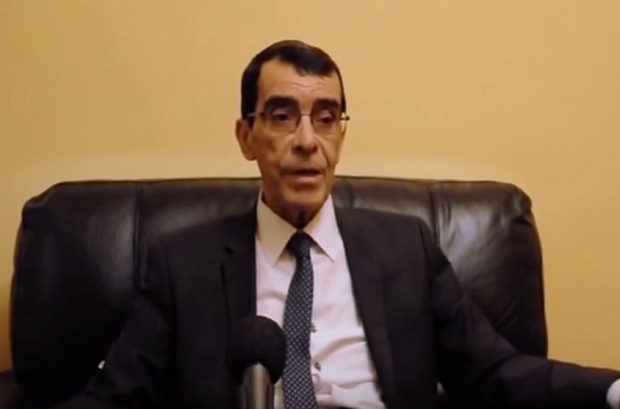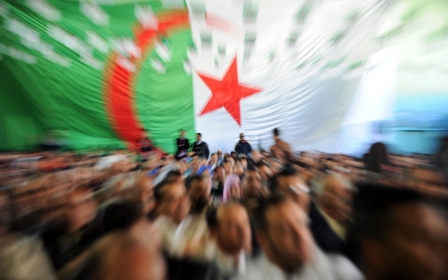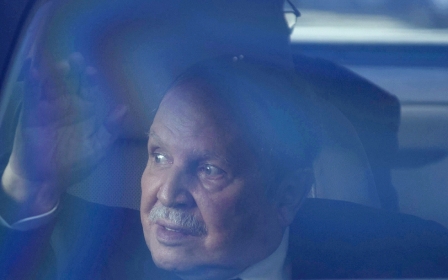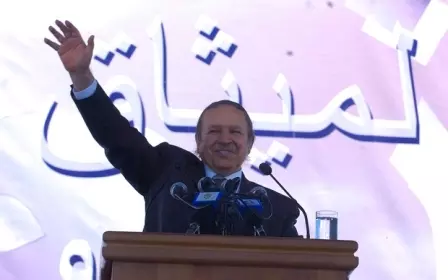Algeria: The generals' endless autumn

ALGIERS - In less than 10 days, the video had 150,000 views on YouTube. For 30 minutes, retired general Hocine Benhadid - President Abdelaziz Bouteflika’s opponent - was interviewed by Radio M, the internet radio network that belongs to the independent website Maghreb Emergen. He lashed out at Said Bouteflika, the president’s younger brother, as well as Lieutenant General Ahmed Gaid Salah, the Algerian army’s chief of staff.
"A bunch of madmen, headed by Said Bouteflika, are plundering the country," Benhadid said.
"The people will rise up if Said wants to impose himself as a successor to his brother. ... A mafia is ruling Algeria today. ... Bouteflika is conscious only for 30-40 minutes per day. ... Gaid Salah is nothing, he is only powerful through his phone and his chair. He has no seat in the army, he can’t even summon the leaders of the military regions, and nobody follows him. He was appointed in 2004 as chief of staff because he was delaying files, as he is weak."
He also attacked the "oligarchs" close to the president's brother, mostly Ali Haddad, a businessman and owner of the main construction business in the country, owner of several media outlets and the football club USM Alger.
"Ali Haddad allows himself to give orders to ministers and nobody reacts!" he said.
A few days later, Ali Haddad announced that he plans to file a complaint against the retired senior officer.
‘Coup d’etat’
In the same week, he reappeared on the opposition TV channel al-Magharibia, where he made a sensational revelation about the details of a meeting held by the generals in Algiers three days after the electoral victory of the Front Islamique du Salut (FIS) in December 1991.
"Everyone had to give his opinion, but no one knew that a coup d’etat, fomented by the high command, was already being plotted against President Chadli."
Worse still, he revealed that the generals, including then-defence minister Khaled Nezzar "planned to overthrow the president in June 1991". On 11 January, 1992, President Chadli indeed left his post at the army’s request.
The response to such statements did not take long to surface. On 7 October, when travelling back to his home at Ben Aknoun – a neighbourhood located in an area known as the Heights of Algiers - Benhadid was arrested and transferred the same evening to the Algiers-centre court following a complaint filed by the Ministry of Defence.
By midnight, the 71-year-old former general was placed under a detention warrant and imprisoned in al-Harrach (Algiers’ eastern suburb) for "disclosure of military secrets," "outrage and call to disobedience," "impairing the troops’ morale" and "defamation".
The charges are numerous and may have been issued by unofficial sources, since his lawyers did not have access to his file.
Breach of procedure
"He was questioned by the judge all night long, although he was ill and couldn’t walk without his cane. They didn’t even allow him to use the elevator at the Algiers court," one of Benhadid’s lawyers told the Arabic daily al-Hayat on the condition of anonymity.
Another of his lawyers, named only as "Mr Mechri," denounced in al-Watan newspaper "the conditions of Benhadid’s arrest and the breach of the legal procedure" because a search carried out at Benhadid’s house one day after his arrest was conducted in his absence.
"The brutality of the arrest bears the fingerprints of the chief of staff," said one official at the Army Veterans Association who was contacted by Middle East Eye.
"He had received notices from the justice court last week but he didn’t show up," retorted an Algerian presidencial source.
A former senior officer who spoke to MEE said: "We are not supportive of Benhadid’s inflammatory statements, even [if they were] against the leaders we do not appreciate."
"But we do condemn the forceful arrest of a general, veteran of the War of Liberation, former chief of a military region, a commander of a military division, and one of the most active counterterrorism officers," he said. "It is shameful."
"In recent months, cases of administrative persecution, passport withdrawal and brutal exclusion are affecting several former senior army and DRS [secret service] officers," added the retired officer.
‘Cowboy mentality’
He cited in particular the case of retired staff General Mehenna Djebbar - a former military and intelligence chief from the 1990s - who was banned from leaving the country "because of his anti-Bouteflika position".
He also cited the arrest of General Staff Abdelkader Ait Ouarabi in late August. Nicknamed "Hassan," he was chief of the Scorat – the operational coordination and counterterrorism intelligence unit - for the past 15 years. He has been accused of "forming an armed group," "illegal weapon storage," "destruction of military records" and "breach of military code".
"Again, behind General Hassan’s imprisonment are the chief of staff’s fingerprints," a DRS officer told MEE. "Hassan did not obey Gaid Salah, particularly during the Tiguentourine assault [a hostage-taking at the oil base in January 2013]. He is efficient but with a cowboy mentality."
A senior military officer told MEE he recalled the context: "Imposing Bouteflika for a fourth term in April 2014 could not go on without triggering strong disapproval among the higher ranks. The tandem Bouteflika-Gaid Salah failed to get consensus within the army. Suddenly, the two powerful men retaliated against all defiant voices."
'I am the whole of Algeria'
There are, among the defiant voices, former army leaders who reject the lack of collegiality in Algeria's political decisions.
"Whereas before there was a coherent group in command who made decisions, today we have no real leaders," Benhadid said to the radio show al-Magharibia before being arrested. Indeed, Bouteflika spent 15 years dismantling - one general after the other - the power of the military, historically decisive in the Algerian system.
"He turned against the generals who brought him to power in 1999 and ... he is completing the purge with the help of his military arm, Ahmed Gaid Salah, who owes him everything, beginning with his post," said a former minister.
Clinging on to power, Bouteflika, who no longer accepted being presented as the civil puppet of the powerful high-ranking generals, said in 1999: "I am the whole of Algeria, the incarnation of the Algerian people. Tell the generals to destroy me if they can!"
Thus, throughout Bouteflika’s first three terms, the "hawks" of the army, the "political generals," and the "janvieristes" (those who in January 1992 led the coup against President Chadli) have disappeared one by one from the circles of power.
And the last of this line - the "citadel" of the army’s power, Mohamed Lamine Mediene, nicknamed "Toufik," head of the secret services for 25 years - was forced to retire in mid-September 2015.
By sacking, ostracising or jailing his opponents within the military rank, Bouteflika is finally alone to decide the scenario of his succession.
"Well, that’s what he thinks," a former state senior officer contacted by MEE said.
"For the deep structure of the Algerian system remains of a military-security nature, and it will even more so when facing future crises linked to the fall in oil prices and the collapse of Libya. At that time, for the survival of the Algerian system, the group of men who counted in the past but are today marginalised, will reorganise themself informally in order to have a say in the decision-making process."
This article was translated by Ali Saad and originally published on Middle East Eye’s French page on 5 October 2015
New MEE newsletter: Jerusalem Dispatch
Sign up to get the latest insights and analysis on Israel-Palestine, alongside Turkey Unpacked and other MEE newsletters
Middle East Eye delivers independent and unrivalled coverage and analysis of the Middle East, North Africa and beyond. To learn more about republishing this content and the associated fees, please fill out this form. More about MEE can be found here.




